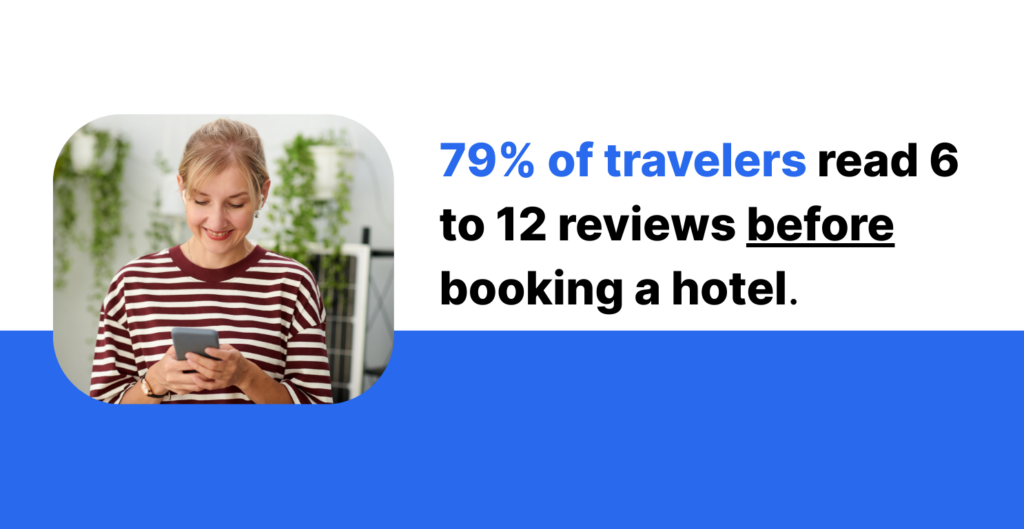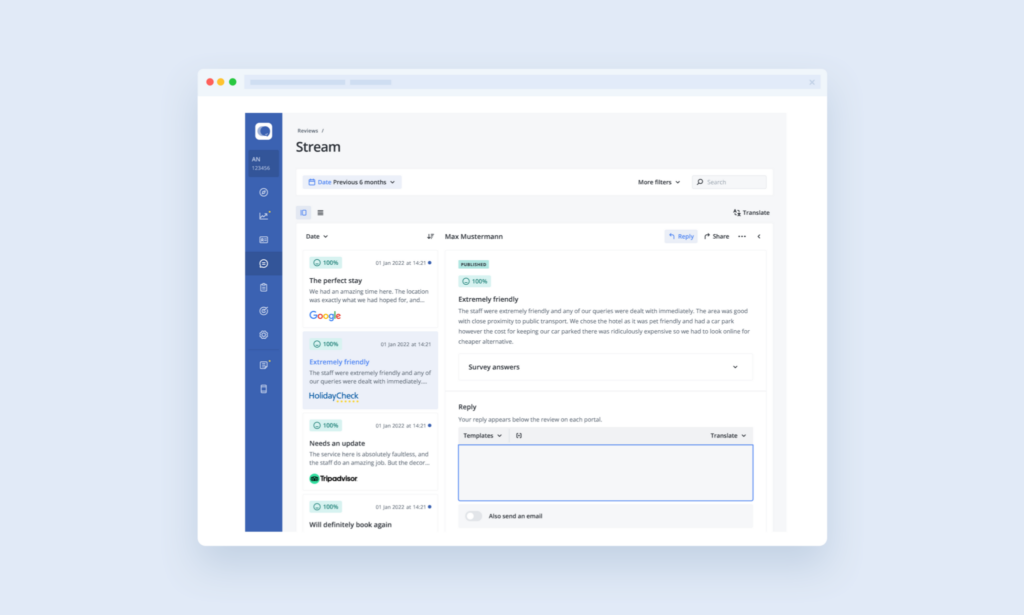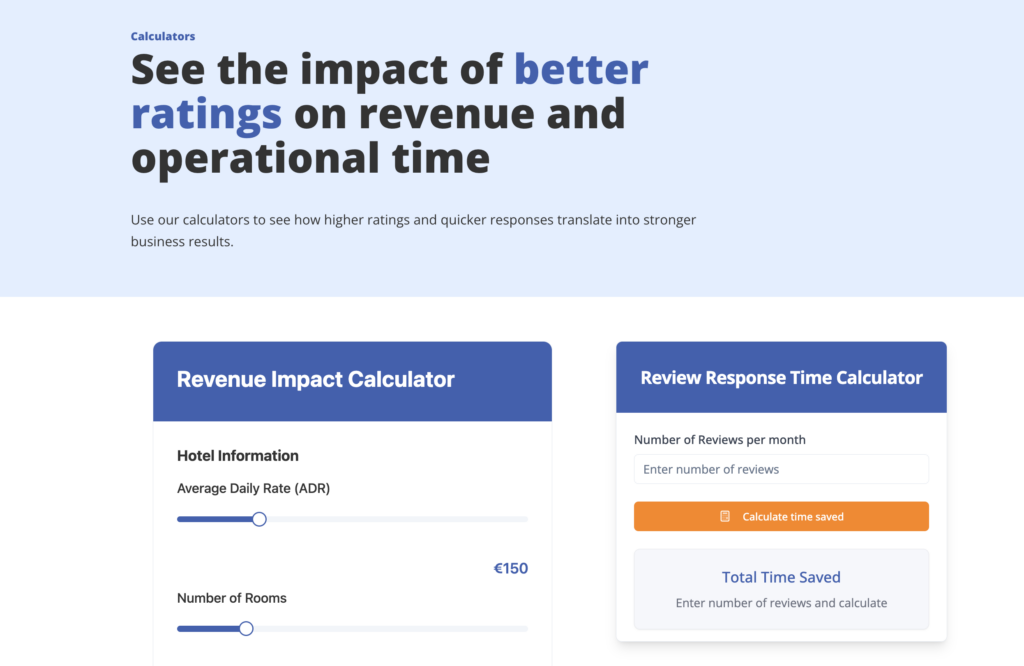Guest reviews don’t just reflect a guest’s experience, they influence the next one. They’ve always mattered, but now, they shape nearly every booking decision. According to recent studies, around 97% of people consult reviews before reserving a room.
That’s why so many hotels invest time and resources into their online reputation management. But what’s the actual return? What do you really get back from efforts like collecting and replying to reviews or sending out post-stay surveys? Especially if you’re thinking about using a review management software, you probably want to understand the impact it makes and whether the results go beyond operational convenience. It’s not always obvious at first. But the return is real and worth taking a closer look at.
Note: In this article, we look at the return on investment in online reputation management. Especially when it’s done with the help of the right software. Customer Alliance is our very own guest feedback data insights platform. We’re proud of what we’ve built and have helped thousands of hotels enhance their online reputation over the past 15 years. Want to see how it works? Book a 15-minute intro here.
What’s the ROI of online reputation management for hotels?
The ROI of online reputation management for hotels lies in its ability to turn guest feedback into measurable business growth, from higher bookings and revenue to stronger guest relationships and more efficient operations.
When done right, it delivers value across every stage of the guest journey, supporting long-term success.
To make this impact easier to understand, Customer Alliance created a simple five-pillar framework called DIGIT. Each letter represents one type of return hotels can expect when they manage their reputation with purpose.
The returns of online reputation management are:
D: Direct Bookings
I: Increased Revenue
G: Guest Satisfaction
I: Improved Visibility
T: Time Saved
This is what hotels can expect in return when they manage their reputation with the right tools. More bookings. More revenue. Happier guests. A stronger presence across digital platforms and OTAs (Online Travel Agencies). And a team that works more efficiently.
In the next sections, we’ll look at each return and how it ties into daily operations and long-term goals.
1. Direct Bookings: How does effective online reputation management drive more direct bookings?
Effective online reputation management drives more direct bookings by building guest confidence and increasing your hotel’s appeal during the decision-making process. This is the first return covered by the DIGIT framework, where D stands for Direct Bookings.
Public reviews help travelers evaluate your hotel before they even visit your website.. Research shows:

Also:
- For those under 40, reviews are more important than price when booking a hotel
- 85% of short-term rental guests read at least five reviews.
When travellers see recent, positive reviews and thoughtful responses, they are more likely to book directly through your website, by phone, email, or in person, rather than using an online travel agency like Booking.com or Expedia.
Why do direct bookings matter for your hotel?
Direct bookings mean more revenue for your hotel, without losing a share to third-party commissions.
Mostly importantly, direct bookings give you more control over the guest journey. You can personalise communication, build credibility earlier in the process, and create more opportunities for upselling or loyalty follow-up.
Trust leads to loyalty and repeat direct bookings
Besides attracting new guests, that early trust also deepens the connection with those who have already stayed. When hotels continue the conversation beyond check-out, they are not just sending a signal to future guests, but speaking directly to the guests who took the time to share their feedback, and making them more likely to return.
A study published in Cornell Hospitality Quarterly tracked guest behavior over time and found that when hotels engaged with guests through post-stay surveys and thoughtful follow-ups, those guests became nearly 50% more likely to return and shifted their booking channel toward the hotel’s own website.
In fact, the same study found that such engagement led to roughly a 5% increase in direct bookings by strengthening loyalty and reducing dependence on OTA channels.
Consistency and recency also make the difference in hotel reputation management
While thoughtful engagement builds trust and drives new direct bookings, consistency and timing also shape how that trust is perceived. It is not just about what guests say. When they say it and how your hotel responds over time plays a big role in whether that trust turns into a direct booking.
According to recent data, 67% of consumers say reviews from the past three months are important in shaping their trust, while reviews older than a year are largely dismissed.
Responsiveness matters too. 53% of consumers say hotels should respond to negative reviews within a week, and about one-third expect a reply within just three days. That kind of timely communication shows that the guest experience continues to matter even after check-out.
Hotels that maintain a steady flow of current reviews and respond promptly create a sense of ongoing care and reliability. That presence helps reduce hesitation during the booking process and makes it more likely that guests will choose to book directly through your own channels rather than relying on third-party platforms.
Pro tip 💡 Customer Alliance’s AI Reply Assistant helps hotels respond to reviews quickly and naturally. It creates personalized messages that match your brand voice, so you can stay engaged without increasing your team’s workload.
The Distribution feature also takes care of review visibility by automatically splitting guest invitations between your personalized survey and public platforms like Google or Tripadvisor. That way, your hotel stays active on the portals that matter most.

2. Increased Revenue: How does effective online reputation management increase your revenue?
Effective hotel reputation management increases revenue by boosting your pricing power, improving occupancy rates, and encouraging more direct bookings through stronger guest trust.
The first “I” in the DIGIT framework stands for Increased Revenue. After all, keeping your business healthy and profitable is what allows you to keep delivering great experiences day after day, guest after guest.
A better reputation doesn’t just attract more guests, it increases how much they are willing to spend. 76% of guests would pay more for a hotel with better guest reviews.
In addition to it, multiple studies confirm the link between review scores and revenue performance. For example, a one-point increase on a five-point review scale can allow a hotel to raise its rates by up to 11.2%, according to a study from Cornell’s Center for Hospitality Research.
In fact, three out of four consumers say they would pay more for a vacation rental with better reviews, and nearly one in four would pay significantly more. This shows that guest feedback affects not just trust, but pricing power.
Online reputation also influences Revenue Per Available Room (RevPAR).
A 1% improvement in a hotel’s reputation score has been shown to increase revenue per available room (RevPAR) by up to 1.42%. This same 1% lift in reputation can also lead to a price increase of up to 0.89% in average daily rate (ADR) and an occupancy increase of up to 0.54% (Cornell Hospitality Report). These are not abstract gains, they reflect measurable revenue growth directly tied to how guests perceive and review your hotel.
Revenue impact calculator for your hotel reputation management

Curious how your reputation score affects your bottom line? To make this relationship easier to understand, Customer Alliance created the Revenue Impact Calculator, a free tool that helps you estimate how improvements in your reputation score could translate into additional revenue.
Based on hospitality benchmarks and research from Cornell University, the calculator uses your own hotel data to simulate revenue potential from better ratings.
Try the Revenue Impact Calculator
It’s a simple way to explore how reputation improvements could support your hotel’s financial goals, based on data, not assumptions.
3. Guest Satisfaction: How does hotel reputation management improve guest satisfaction?
Hotel reputation management improves guest satisfaction by helping hotel teams understand guest expectations, respond to feedback, and make meaningful service improvements based on real experiences.
If you’ve been following the DIGIT framework, you already know the G stands for Guest Satisfaction. And while every return matters, this one has something special. Because guest satisfaction is what hospitality is all about.
It’s in the moment a guest walks into a space you’ve built with care, is greeted by a team that truly enjoys what they do, and leaves feeling better than when they arrived. That kind of experience doesn’t just happen, it’s created through daily effort, consistency, and attention to feedback.
You can see the results in the reviews. The ones that mention the kind welcome, the thoughtful touches, or the quick action when something wasn’t quite right. You hear it in custom surveys, where guests open up about what made them feel relaxed, valued, and heard.
Every time you respond to feedback with care, share it with your team, or use it to improve something small, you are creating more satisfaction. And that shows both in guest relationships and in how your hotel is remembered.
Can responding to hotel reviews improve guest satisfaction?
Yes, responding to hotel reviews can improve guest satisfaction by showing guests that their feedback is valued and by demonstrating a hotel’s commitment to service and improvement.
With review management software, you can respond promptly to guest feedback, showing your gratitude and reinforcing their positive experience. By acknowledging their review, you’re essentially saying, “We hear you, and we appreciate you.” This simple gesture makes guests feel valued, and it could encourage them to recommend your hotel to their friends and family. That’s word-of-mouth marketing, and it’s as powerful as it gets.
On the flip side, picture this. A guest has posted a less-than-stellar review, expressing dissatisfaction over slow room service. Rather than seeing this as a stain on your reputation, view it as an opportunity to win back their trust. With effective review management software, you can quickly address their concerns, showing potential customers that you’re committed to resolving issues and improving guest experiences.
Why does it matter? A study found that 33% of guests who received a response to a negative review later posted a positive update. That single gesture can shift someone’s perception completely.
Also, Harvard Business Review found that ‘’simply receiving a response increased the customer’s willingness to pay (for products and services) later, even in cases where customers were aggrieved… A mere acknowledgement of the customer’s problem can defuse initial frustration and put the customer back on the road to loyalty. Instead of the customer seeing the company as the enemy, a sympathetic response can reorient the situation so that the customer now feels that the company is on his or her side.”
Turning hotel reputation management feedback into actionable insights
Responding to guest feedback is only part of the story of building amazing guest experiences. The other part is what you learn from them and how you use that information to shape the stay.
When several guests mention that breakfast could be more varied, it’s not a complaint, it’s a clear direction. If many highlight how relaxing the spa was, that’s an opportunity to tailor future offers or services. You’re not guessing what matters, you know.
Pro tip 💡Customer Alliance’s survey tools make this process easier, helping you collect targeted feedback and turn it into actions your team can take. Whether it’s spotting issues early or reinforcing what guests love, surveys help ensure that satisfaction isn’t accidental it’s repeatable.
When guest feedback is collected, understood, and acted upon whether through reviews, surveys, It becomes loyalty. It becomes advocacy. It becomes the reason someone chooses your hotel again or tells their friends about the incredible stay they had.
And that’s the return you get when hotel reputation management is handled with care. Not just higher scores, but deeper relationships. Not just feedback, but insight. Not just happy guests, but guests who come back.
4. Improved Visibility: How does effective online reputation management impact your hotel’s visibility?
They impact your hotel’s visibility by increasing review activity, adding relevant user-generated content, and sending trust signals that help your property rank higher on Google, OTAs, and local search results.
Visibility is the moment everything comes together. You have built a great experience, your guests are leaving glowing reviews, and now it is time for the world to see it. The second “I” in the DIGIT framework stands for Improved Visibility, and in hospitality, that is what puts your hotel on the map.
Effective hotel reputation management shapes exposure. Every review you collect and every response you write contributes to your ranking on platforms like Google, Booking.com, Expedia, and TripAdvisor. The better your review signals, the more likely you are to appear first when potential guests search.
Reviews influence algorithms as much as they influence guests
Search engines and OTAs prioritize listings with high scores, frequent reviews, recent activity, and consistent responses. These signals tell platforms your hotel is active, trusted, and relevant. Google confirms this in its own documentation, noting that businesses that respond to reviews are 1.7 times more likely to be considered trustworthy.
Even the language in your reviews plays a role. When a guest highlights “close to the station” or “peaceful rooftop terrace,” and your reply reinforces that experience, your content becomes more relevant for local search terms. This is exactly where SEO and reputation management align.
Does responding to reviews help SEO?
Absolutely. Every review and every response adds fresh, user-generated content to your online presence. This content helps search engines understand what your hotel offers, who it serves, and how active you are. Platforms like Google scan this information to evaluate relevance, trust, and engagement.
When you respond to reviews consistently, especially using specific language about your location, amenities, or guest experience, it reinforces key search terms and boosts local discoverability.To rank better, you need to combine consistency with strategy. One simple way is to use keywords in your reply to reinforce the themes guests are already mentioning. It is not just about being polite. It is about being relevant.
5. Time Saved: Hotel reputation management saves time for what matters most
The last letter in DIGIT stands for Time Saved, and it is a return that every hotelier can appreciate. Because when you are running a hotel, time is not just money, it is presence. It is the ability to look up from the screen and connect with a guest who needs something. It is the space to brief your team, check in with housekeeping, or simply make sure the atmosphere in the lobby feels right.
And yet, we all know how time-consuming review management can be. Logging into multiple platforms, tracking unanswered reviews, responding manually in different languages, keeping the tone on-brand. It adds up quickly. The more reviews you have, the more time it takes. But when review management is streamlined, the return is clear.
By centralizing guest feedback and automating parts of your response process, your team can work smarter. Tools like Customer Alliance help you manage all your reviews from one place and respond in a consistent, thoughtful way without needing to start from scratch each time.
You save time, and that time goes back into the guest experience.
Instead of sitting behind a screen replying to reviews one by one, your front desk team is free to welcome arriving guests. Your manager has more room to train staff or check room readiness. The investment in a review management solution pays off not just in efficiency, but in the quality of every face-to-face moment you create on property.
Curious how much time you could actually save?
Check out our Review Response Time Calculator to get a quick, realistic estimate. Just enter your average number of reviews and see how automation can lighten the load.
Wrapping up: Customer Alliance can help you get more from online reputation management
If you’ve made it this far, you’ve seen what strong review management can do. More direct bookings. Higher revenue. Happier guests. Better visibility. Time saved.
That’s the ROI of online reputation management. And it’s exactly what Customer Alliance is built to support. Customer Alliance helps hospitality teams bring structure, focus, and clarity to every step of the review process. By combining data with personalisation, and with action, we empower hoteliers to deliver experiences that guests remember and share.
Pick a time for a 15-minute chat with one of our hospitality experts. This conversation is about your needs and goals. Start making your hotel’s reputation work harder for your business.

